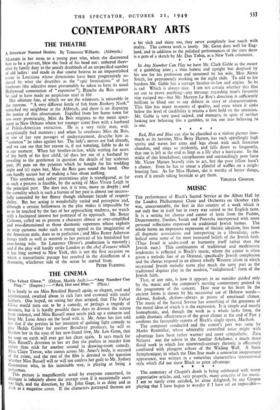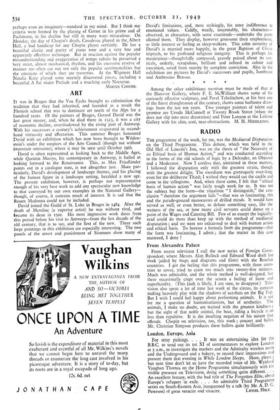MUSIC
THE performance of Bloch's Sacred Service at the Albert Hall by_ the London Philharmonic Choir and Orchestra on October 13th was, unaccountably, the first in this country of a work which is not only fine in itself but in every way suited to the English taste. It is a setting for chorus and cantor of texts from the Psalms, Deuteronomy, Exodus, Isaiah and Proverbs interspersed with more personal reflections expressed in traditional Jewish hymns. The whole forms an impressive expression of theistic idealism, free from all dogmatic associations and interpreting in a liberalistic, sym- bolical sense some of the most treasured beliefs of the Jewish faith. (Thus Israel is understood as humanity itself rather than the Jewish race.) This combination of traditional and modernistic tendencies is reflected in Bloch's music, where the cantor is often given a melodic line of an Oriental, specifically Jewish complexion and the chorus respond in an almost wholly Western idiom in which occasional Jewish melodic turns play much the same part as the traditional dogmas play in the modern, "enlightened," form of the Jewish faith.
That, at any rate, is bow it appears to an outsider guided only by the music and the composer's moving commentary printed in the programme of the concert. How near to his heart lie the ancient forms is shown by his occasional use of Hebrew words- Adonai, kodosh, sholom—always at points of emotional climax. The music of the Sacred Service has something of the greatness of the moral ideas of which it is the expression. It is simple and mostly homophonic, and, though the work as a whole lacks form, the noble dramatic effectiveness of the great climax at the end of Part 3 confirms the favourable reports of Bloch's single opera, Macbeth.
The composer conducted and the cantor's part was sung by Marko Rotmiiller, whose admirably controlled voice might with advantage have been rather warmer and more sympathetic. Zara Nelsova was the soloist in the familiar Schelomo, a much more florid work in which late nineteenth-century rhetoric is effectively combined with plangent echoes of the Wailing Wall. A Suite Symphonique, in which the Dies Irae made a somewhat inopportune appearance, was written in a somewhat characterless international style which did not show Bloch to great advantage. * * * The centenary of Chopin's death is being celebrated with many appreciative articles and, very properly, many concerts of his music. I am so rarely even satisfied, let alone delighted, by any Chopin playing that I have begun to wonder if I have set an impossible- perhaps even an imaginary—standard in my mind. But I think my criteria were formed by the playing of Cortot in his prime and of Pachmann, in his decline but still in many ways miraculous. On Monday, the day of Chopin's death, Casadesus played in the, Albert Hall, a bad handicap for any Chopin player certainly. He has a beautiful clarity and purity of piano tone and a very fine and apparently effortless technique. But in reaction against the popular misunderstanding and exaggeration of tempo rubato he preserved a Very strict, almost mechanical, rhythm, and his excessive reserve of manner too often cut out not only the popular sentimentalities but the emotions of which they are travesties. At the Wigmore Hall Natalia Karp played some recently discovered pieces, including a beautiful A flat major Prelude and a touching early Nocturne.
MARTIN COOPER.



































 Previous page
Previous page